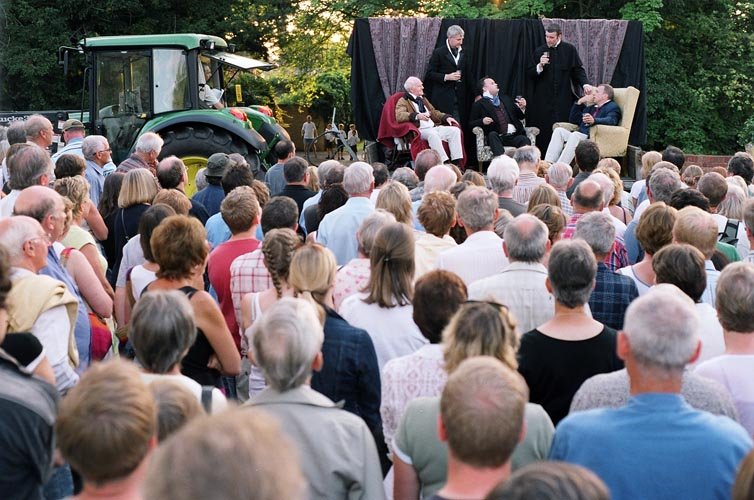Don’t Mention The Oil
It’s 1944 and Mr Winston Churchill has sent his crack team of Patriotic Players to Eakring to bolster morale now that it finds itself a possible bombing target of the Luftwaffe. With a mixture of comedy, film, music and special effects, the team rattle through the most exciting moments of the village’s history. The church becomes filled with great rectors of old; the village hall is turned into a cinema; and the local schoolchildren stage a play about William Mompesson. But whatever you do, don’t mention the oil!
Eakring’s first ever community play was a witty and energetic celebration of its heritage and the moment when Eakring became the war’s best-kept secret. We made a trio of films for the project, with history book in hand but tongue in cheek…



The Magnificent Maplebeck Caper
‘This evening we are here to tell you the story of a Nottinghamshire village not unlike this one. In fact it’s very much like this one. Because it is this one…’
With a total population of sixty two and the smallest pub in the county our Magnificent Maplebeck Caper was a romp through the history of a place where we could discover very little (if anything) of note. But no matter. From the Vikings to today – via the Domesday Book, the Crusades and the installation of the village phone box, we left no stone unturned as we tried to answer the big questions: What makes Maplebeck, Maplebeck? Is it true that the village was lost in a game of cards? Where did all the farms go? And how on earth did a landlord that enormous fit inside a pub that small?



The Sparrow Killer and Other Norwell Truths
The third show took place in Norwell, and things were becoming more and more ambitious.
‘Hillary Hubble, a dusty historical lecturer, has arrived to give a talk about Norwell’s medieval past and her love of prebends – but revolt is stirring amongst the village’s oldest inhabitants – the gargoyles! When the grotesque carvings start to heckle and jeer Ms Hubble realises that she knows little about the real history of the village – the stories of the people who have lived there and the things they have got up to over the years. Join Hubble in a quest to find the true heart and soul of the village and find out about the things that never make it into the history books!’
A performance that ended with the audience sitting on piles of hay bales in the middle of a moated field.



He Had Roses In His Heart
“He who would have beautiful Roses in his garden must have beautiful Roses in his heart.” So begins Dean Hole’s celebrated A Book About Roses, one of the most formidable publishing successes of Victorian England. And Caunton was home to the great man: an immensely popular preacher, friend of the greatest writers of the day and known throughout the land as The Rose King.
He Had Roses In His Heart was the story of a friendship between a simple gardener and Caunton’s most famous son. Combining local tales of murder, merriment and manure it attracted a huge audience as we wended our way through the village and scenes took place in brooks, amidst gravestones, on the back of tractors, in the grounds of a magnificent house and culminating in the church where rose petals fell from the sky and a choir brought the series of shows to a beautiful conclusion.









